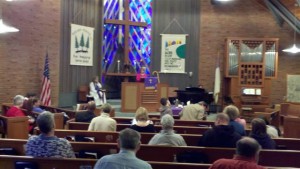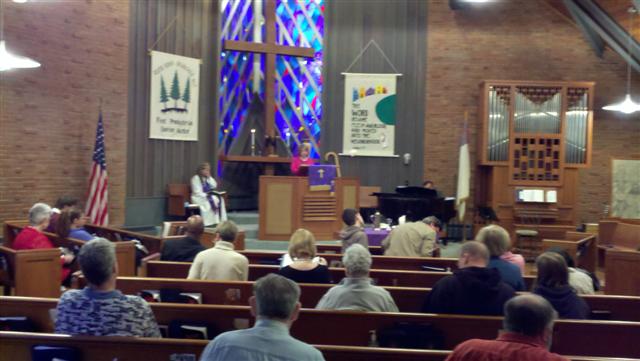Evangelism And Justice – by Laurie Hartzell
 It is refreshing to see an “and” between these two words rather than an “or.” As a child growing up in the 1960s I remember dinner time conversations when my parents were concerned that our Lutheran church was getting too involved in the “social gospel”—civil rights, feeding the poor and helping prisoners– and not teaching people about being saved by the love of Jesus. I’ve also been at table with beloved Christian friends over the years when the conversation has been about civil rights and doing justice in our world, but somewhere in the ministry, the life of faith in and with Christ was lost.
It is refreshing to see an “and” between these two words rather than an “or.” As a child growing up in the 1960s I remember dinner time conversations when my parents were concerned that our Lutheran church was getting too involved in the “social gospel”—civil rights, feeding the poor and helping prisoners– and not teaching people about being saved by the love of Jesus. I’ve also been at table with beloved Christian friends over the years when the conversation has been about civil rights and doing justice in our world, but somewhere in the ministry, the life of faith in and with Christ was lost.
It seems that this dichotomy between evangelism and justice has been inbred in the church in the United States for decades. For the most part, churches focus on either evangelism in teaching people how to share their faith or they focus on what are seen as justice ministries—feeding the poor, providing housing, civil rights struggles, and the like. When we create this division by offering people either words of spiritual comfort alone or a way to meet physical and/or social needs alone we are missing out on receiving the transformed life and community that the love of God through Jesus is all about.
The Scriptural concept of salvation refers to Christ’s redeeming work that touches every part of life—spiritual, physical, emotional, and communal. When we fragment the Good News of salvation, by doing evangelism alone or doing justice alone, it is like giving people only an apple from the tree rather than inviting them to dwell in the orchard.
While it is easy to talk about the integral connection between evangelism and justice, the dichotomy can be so engrained in us that it is hard to live it out. The church I serve in Benton Harbor, Michigan invites the community to dinner every Thursday night. This supper began as a way to provide a simple meal and some mentoring and fellowship for men and women who were in the correctional facility a few blocks from the church. It has evolved into a time when families with children and homeless people come as well. In the beginning, the meal was just a meal, and some people wondered if we should use the same format as the Soup Kitchen nearby. The Soup Kitchen provides a much needed service to homeless people who would go hungry without it. But we knew we were being called not only to meet a physical need, but to provide a space where people could commune with God and God’s people as well. So for us, inviting people to dinner is not just about giving them food. It is about getting to know people, providing a space where all people—not matter who they are, where they came from or how they smell– are treated with dignity and respect, and can have some much needed family time around our tables. Before the supper, we have our church prayer meeting. But all of us would agree that our prayer is not only what we do in a circle with our hands folded, but it is what we do when we are given the grace to see Jesus in the eyes of our guests. People talk about their lives. We have some homeless Vietnam vets who are experiencing some of the healing of Jesus as they tell us their stories. Our faith is being strengthened as we hear stories of courageous faith from our neighbors. On Thursday nights, we feel that evangelism and justice are the same and are strands in a tapestry of love and fellowship that God is creating in and with us.
The Good News is that Jesus Christ has come to transform our lives through God’s amazing steadfast love. This transformation frees us from our attachment to all that separates us from God and all that separates us from each other. That is the great commandment, to love God and to love our neighbor. The weaving together of evangelism and justice within the life of Christ embodies this great commandment.
Loving our neighbor means wanting for our neighbor what we have for ourselves. Loving our neighbor means that when some have food and others don’t, there is not peace in our world. Justice happens when all people have what they need. True love gives birth to justice. And a community of justice fosters love. And this is the Good News!
So, it is not only refreshing to see the “and” between the words evangelism and justice, it is foundational to our faith as those in relationship with God through Jesus Christ. Let’s be those whose children say years from now that they remember discussions around the dinner table where the adults were rejoicing in the love of God and grieving that some in this world don’t know that love. Let’s be those whose children say years from now that they remember discussions around the dinner table where the adults were wrestling with how God was inviting them to share their belongings and their lives so that justice could be done and everyone can live in the orchard together in peace.
Evangelism AND justice—may it be so!


Evangelism AND justice—may it be so!
Thank you for the reminder of what the church is called to be and to do.